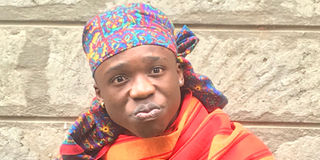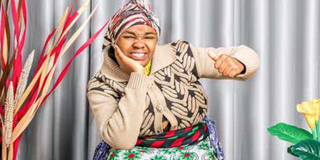
From left: Social media comedians Austin Muigai, Crazy Kennar and Njugush during the launch of Kachingching na Coke on May 16, 2024, in Nairobi.
A few years ago, Kenya’s comedy landscape revolved around stand-up acts, mainstream TV shows, and skit-driven YouTube channels. But a new wave of comedians is rewriting the script, wielding nothing but a smartphone and an internet connection. Online comedians—armed with wit, relatability, and short-form storytelling—are shaking up the industry, amassing millions of followers, and influencing mainstream entertainment in ways never seen before.
Comedy in bite-sized clips
TikTok’s explosive rise in Kenya has democratised comedy, allowing anyone with a creative spark to reach audiences without the traditional gatekeepers—TV networks, producers, or expensive production setups. The platform’s short-form nature, with videos typically ranging from 15 to 60 seconds, has created an appetite for quick, digestible humour. Unlike the long stand-up routines that demand patience, this format thrives on instant gratification.
Enter creators like Arap Uria, Flaqo Raz, Henry Newton, Njugush, Naomi Kuria, Morin Actress and Crazy Kennar, who have mastered the art of fast-paced storytelling.
Their skits, often inspired by everyday Kenyan life, relationships, family drama, or political satire, resonate widely. These comedians are not only gaining a cult-like following online but also shaping the future of mainstream comedy.

Singer, dancer, comedian and scriptwriter Erastus Ayieko Otieno aka Flaqo 411, in his famed character Mama Otis.
For some, the “clock app” has been a career breakthrough. Naomi Kuria had been struggling to make it.
"I tried stand-up, but it never worked. The audience was tough, and opportunities were few. But when I started posting skits on TikTok, everything changed. One viral video opened doors I had never imagined," she says.
From online sensations to mainstream stars
They are no longer just digital entertainers; they are crossing over into mainstream media, brand endorsements, and even film.
Take Flaqo Raz, for instance. Known for his impeccable ability to switch between multiple characters in his skits—often portraying exaggerated family situations—Flaqo has built a brand so strong that corporates and brands are now tapping into his influence.

Maureen Mugure Kibui also known as Morin Actress
Similarly, Crazy Kennar, who initially found fame on Facebook and YouTube before embracing TikTok, has expanded his reach beyond comedy. His content has attracted partnerships with brands, invitations to international shows, and even guest appearances on TV. His own live show, Happy Country, is expected to hold a third edition later this year, with many celebrities once again appearing as guest stars.
Bernard Maina, a media and digital culture expert, explains: "(The app) has lowered the barriers to entry in the comedy industry. Previously, aspiring comedians had to rely on TV shows like “Churchill Show” or YouTube. Now, anyone with creativity and a phone can build an audience. Brands are also moving towards influencer marketing, recognising TikTok stars as effective advertising partners. This shift is redefining how comedians monetise their craft."
The migration of these comedians to mainstream entertainment is evident in major collaborations. Some have transitioned into radio and TV roles, bagging hosting gigs, while others have ventured into film, proving that digital comedy is not just a phase but a full-blown career path.
The business of comedy: Monetisation and brand influence
Previously, Kenyan comedians relied on TV appearances, corporate gigs, and live performances for income. Now, the game has changed, as there are multiple revenue stream opportunities.
One major avenue is brand endorsements, with comedians becoming advertising gold due to their massive followings which create viral campaigns.
Creator Fund and live gifts also offer monetisation to the content creators. While not as lucrative as brand deals, they can earn through virtual gifts, direct sponsorships, and collaborations.

Content creators Diana Daisy, Elizabeth Ocampo, Elijah Maina Henry Newton and Isaac Waweru
Additionally, many repurpose their content on YouTube and Facebook, where structured monetisation options provide extra income, making digital comedy more financially viable.
The days of comedians relying on gatekeepers to ‘make it’ are long gone. Now, a viral video can turn a creator into a household name overnight.
Change in Kenya’s comedy style
Kenyan comedy has long been defined by stand-up performances, slapstick humour, and long-form storytelling. However, there is now a new, rapid-fire approach to comedy—one that relies on exaggerated expressions, relatable narratives, and punchy, one-liner jokes.
"I have been forced to be more versatile. Before, I focused on YouTube, but I realised short, relatable clips work best on TikTok. It’s crazy how one video can go viral and change everything overnight!" says Henry Newton.
This shift has forced even established comedians to adapt. Veteran acts who previously thrived on hour-long stand-up specials are now finding ways to break their content into short, engaging clips. Churchill, Kenya’s comedy godfather, has even incorporated TikTok-like skits into his show, proving that the platform’s influence extends beyond digital spaces.

Comedian Timothy ‘Njugush’ Kimani.
The algorithm-driven nature means that talent is rewarded based on engagement rather than industry connections. This has opened doors for young, previously unknown comedians to thrive.
Ann Wanjiru, a university student shares:
"I love how online comedians capture everyday struggles in the funniest way. Crazy Kennar’s skits about campus life and Njugush’s on politics are so relatable! I don’t even watch TV anymore—TikTok is my entertainment hub."
Challenges and the flip side of viral fame
With the opportunities created, also comes the immense pressure to remain relevant. Unlike traditional comedians who could sustain careers over decades, social media stars must consistently churn out fresh content to maintain their audience.
Additionally, some argue that the format also limits depth. Traditional stand-up allows for nuanced storytelling and intelligent humour, while social media often favours exaggerated, meme-like skits. Some critics worry that the fast-consumption nature could also dilute the depth and artistry of Kenyan comedy.
Another challenge is monetisation. Visibility does not always translate to financial stability. Some content creators, despite millions of views, struggle to make a sustainable income without brand endorsements.
What’s next?
The online comedy in Kenya is evolving rapidly. Some comedians are already exploring longer-format storytelling through YouTube and live shows, while others are integrating their content into mainstream media. With the increasing demand for digital-first entertainment, the future looks bright for those who can adapt.

Henry Newton refers himself as a unique comedy content creator due to his witty character in his videos where he plays different characters at a go just like his elder brother the renowned Flaqo.
The rise of these comedians is pushing traditional entertainment players to innovate. Radio and TV stations are scouting for social media stars, while brands are shifting their advertising budgets towards influencer-driven marketing.
Kenya’s comedy scene has entered a new era—one where a smartphone and a funny idea can turn an ordinary person into a national sensation. Social media is a launchpad for the country’s next generation of comedy greats.
As the lines between digital and mainstream entertainment continue to blur, one thing is clear: comedians on social media apps are not just reshaping Kenyan comedy; they are defining its future.












